Thief: The Dark Project
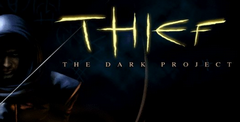
| a game by | Looking Glass Studios, Inc. |
| Platform: | PC (1998) |
| Editor Rating: | 6.3/10, based on 2 reviews, 4 reviews are shown |
| User Rating: | 7.2/10 - 5 votes |
| Rate this game: | |
| See also: | Third-Person Shooter Games, Retro Games, Heist games, Thief Games |
Everyone loves an anti-hero. You know, that particular man or woman who gets embroiled in some ridiculous plot to save the world from evil when they'd obviously rather be looking after number one. Their appeal comes from the fact that they're much more like us than any gung-ho, khaki-covered jock with a big gun and a bad attitude - we can relate to them. And one of the greatest anti-heroes in gaming history has got to be Garrett from the pioneering stealth masterpiece, Thief: The Dark Project.
A man of dubious morals and a decidedly dodgy reputation, Garrett is purely out for a quick buck, and doesn't mind knocking off a few henchmen to get his way. He's a sneaky, devious, underhanded bastard, and it's this character that helped make Thief one of the most compelling and immersive stealth games of all time.
"We wanted a tough, mysterious, jaded anti-hero, someone who was in keeping with our desire to avoid the standard hero cliches associated with the fantasy game genre," agrees the project leader on Thief, Greg LoPiccolo. Defining the exact tone and character of the game's lead figure became an important part of the development process and one that Randy Smith was quizzed on when he joined the Thief team as designer in 1997. Randy also voiced the character of Murus in the game, fact fans, and is now project director on the third Thief game.
"Garrett's original name was Palmer, and he started as a simple paragraph description about a world-weary master thief who's just trying to get by, but whose fate is intertwined with the Keeper prophecies," explains Randy. "Later, a bunch of us were working on briefings and his personality started to emerge out of the voice we were writing in. Eventually, we really worked out the subtle nuances about what really motivates him, what he's conflicted about, what he lies to himself about and how his character develops over time."
Arthurian Zombie Commy-Slasher
But before Garrett had been conceived, deciding on the exact nature of the game was no easy task for the Looking Glass lads. The studio had already shipped Ultima Underworld 1 & 2 and System Shock, and knew it wanted to create an immersive first-person experience. However, before the team settled on the title of Thief, the original game concept went through a number of mutations. First, it was to be a sword fighting game called 'Dark Camelot' (where Mordred instead of King Arthur was the protagonist). There was also what Randy describes as a "satirical shooter" called 'Better Red Than Undead', which involved killing zombies and/or communists. One of the other initial ideas for the game was called 'The Dark Project', a simpler version of what was to become Thief. Although elements of all these original ideas did make their way into the final game (sword fighting and zombies), it was clear that whatever Looking Glass decided to embark on, it would have to show off the dark and moody rendering engine the studio was developing at the time to best effect.
"It was a great engine with which to build a game like Thief, where shadows are so important and the player can control the lighting. I think that it played a big role in the 'thief' idea getting chosen," says Randy. "Essentially, 'The Dark Project' concept was focused down to a single, simple high concept: you are a stealthy master thief in a medieval city, and the equally simple name Thief was chosen to support the clarity of that vision."
Teething Troubles
The developers certainly had more than their fair share of problems bringing Thief together, getting through three project leaders, three lead designers and two lead programmers in the game's two-and-a-half-year development cycle. Added to that was the fact that the Al had to be scrapped and rewritten from scratch in the last few months of the project.
"The last six months of development was a total death march of 14-hour days and seven-day weeks," recalls Greg. "I'm incredibly proud of the game, but I hope to never repeat the experience!" But, as is so often the case with innovative titles, one of the main problems surrounding the development of Thief was a lack of belief, particularly about the potential for a stealth-based first-person game.
Long-time programmer and designer at Looking Glass, Doug Church explains: "Even internally, we weren't sure how well it would work - and our publisher definitely wasn't sold on it. This caused a lot of inefficiency and stress, as we ended up doing lots of 'prove it' demos, adding non-stealth aspects to hedge our bets, or having to explain again what was going to be fun about it."
"I'm not exactly sure how it all came together at the end," agrees Randy. "It was a matter of faith, visualisation and aggressive tuning of the most important parameters. But then one day everyone just got it, and from our own Q&A people to the execs at Eidos, we were getting compliments on what a fun, interesting and fresh game we had on our hands."
Cityscape
The core belief behind creating the Thief world was to break out of what Greg describes as the "elves-and-goblins aesthetic ghetto", which was the perceived view of fantasy games at the time. From that belief, a highly distinctive artistic vision began to emerge, taking its influence as much from films like City Of Lost Children and early industrial factories as from traditional medieval settings. The result was a sprawling steam-era world, mixed with medieval and magical environments, which set the scene for a different type of fantasy game.
The new engine technology enabled very elaborate backdrops within the game, complete with their own beautiful period details, textures and lighting. To further emphasise the dark, moody environments, Thief introduced a now widely emulated light-gauge device, which showed how well Garrett was hidden in the shadows. Though the technology at the time made this a slightly fudged solution, the light gauge eventually proved a far more elegant device than, say, the vision cones of Metal Gear Solid.
The levels also offered a beautiful impression of freedom, giving you the feeling that you could go anywhere your feet and a well-launched rope arrow could take you - even if in reality, the missions were fairly linear. The Al of the NPCs. which had incremental sensitivity levels to noise and visual alarms, completed the sense of realism and unyielding tension.
As a consequence, both Thief and its sequel, The Metal Age. have proved hugely popular with the modding community. Some great fan missions like The Seventh Crystal and the upcoming T2X: Shadows Of The Metal Age have been created using the versatile DromEd level-builder, keeping the series highly buoyant online.
"The best of the Thief mods are really impressive and very gratifying to me personally." says Greg. "I was really surprised at how many fans really bought into the overall fictional world that we created in Thief. The sophistication of the mods is a testament to how good and flexible the Dark Engine scripting system and object system were, not to mention the creativity of the fans."
The Second Coming
But although Thief performed well and received some rapturous reviews, Randy claims that players didn't really warm to some of the horror and combat elements in the game: "They found it a little schizophrenic." As a result, the crypts full of lurching zombies and the more magical elements of the game were sent packing in Thief II: The Metal Age. Instead, the sequel opted for steam-powered robots that chugged up and down corridors with sad, cranky voices and could be incapacitated with a well-placed water arrow. Fortunately, they've been dropped for the third game. The levels also became more domestic, with far more of the game based on creeping around large buildings and city streets. This enabled the team to concentrate more heavily on the stealth aspects of Thief and dull down the combat, which became very much a last resort for the player.
For Randy, the new focus of Thief II was very much a double-edged sword: "In some ways, the new angle was really successful, but in other ways we took it a bit too far and for many players the game lost some of its lustre, depth and unpredictability."
Stealthy Legacy
Needless to say, fans of the series are hugely excited about the prospect of a third Thief episode. Though Looking Glass Studios is long since defunct, several of the original team have been gathered together at Ion Storm, under the watchful eye of Warren 'Deus Ex' Spector.
The new game. Thief: Deadly Shadows, was put on the back burner while Deus Ex: Invisible War was completed, but the team at Ion Storm is now working day and night to get it finished. What we've seen so far is very promising, and suggests the developers have stuck to what made the original so great, focusing on creating an immersive, interactive world, with the focus on softly, softly, rather than wading in with a big sword. (We're off to Ion Storm to play the game next issue, so stay tuned for a full preview soon.)
But regardless of the success or otherwise of the new sequel, it's the original game that will always be remembered as the pioneering classic, the one that proved the viability of an entirely new style of gameplay. In the words of designer Randy Smith: "It's really flattering when we see games that have stealth models that are clearly based on Thief. Many games have stealth elements these days, but Thief seems to have defined a point on one side of the spectrum. If you want to make a comprehensible game that's truly first and foremost about stealth, you need to look to Thief as your starting point."
Download Thief: The Dark Project

System requirements:
- PC compatible
- Operating systems: Windows 10/Windows 8/Windows 7/2000/Vista/WinXP
Game Reviews
Realism. Games developers are always banging on about realism. They're obsessed. Picture the scene: It's an average afternoon at Dennis Publishing. Everyone in the building is busy forging ahead with an exciting career in the cut-'n'-thrust, cut-'n'-paste world of magazine production. Every desk is an epicentre of efficiency, every floor a hive of industry. Except for the basement, that is, where the feckless slackers on PC ZONE are lounging in chairs, eating pies and having a new game demonstrated to them.
Yes, demonstrated. These days an increasing number of software houses aren't content to simply bung a pair of CDs in a jiffy bag and mail it our way. Oh no. They have to come in and personally test drive the game before our very eyes, as if we were children. Or simpletons. Or just too damn lazy to play it for ourselves. They know us too well.
Occasionally the program under scrutiny is glaringly rubbish, and an
embarrassing and awkward ceremony ensues wherein the games company PR droid asks uncomfortable W questions like What do w you think of it?", and the slacker tries to answer with some kind of vaguely positive. non-committal statement because if he spoke the truth right there W and then the droid would ry to stab himself to death A with a biro. Better to bottle it up and let it all flow out in the finished V article. The droid can biro his lungs out on his own sodding time.
Anyway, the only reason I a company sends in one of their glassy-eyed henchmen to demonstrate the code in the first place is so they can sit there and point out all the details. And this is where the obsession with realism starts to kick in.
Look at that flaming torch on the wall," they'll say, pointing at a clutch of pixels. Look, see - the shadows actually flicker." On-screen, they approach the torch for a closer look at the dancing shadows, and in the real world turn to check you're paying attention. See? See how they flicker?" And they stare at you until you nod.
Realism, realism, realism. Trouble is, while the visuals may be realistic, the action itself is absolute toon time; the authenticity fetish suddenly evaporates, and instead we're left with screenfuls of absurd gung-ho conflict, with severed arms and legs and heads and bullets and blood and laser rifles and hordes of slavering octopoid invaders from the planet Zaglon B. But hey, those shadows flicker.
What's this got to do with Thief? Everything. The makers of Thief are trying to create a 3D first-person perspective action-adventure game with realistic gameplay. Do they have a hope in hell? Probably not. But if anyone can pull it off, the guys from Looking Glass Studios can.
Watch Out. There's A Thief About
Looking Glass' track record is impressive (see CV panel, left): Ultima Underworld, System Shock, and Terra Nova - unconventional envelope-pushers, the lot of'em. While many developers are content to hurl the player into a 3D environment stuffed with bad guys, chainguns and ceaseless u mayhem, Looking Glass have always done things differently, concentrating instead on concentrating instead on storyline, atmospherics and pacing.
Thief carries on that tradition. The concept is simple: when all's said and done, it's a game in which you play a slippery little bastard. You take the role of Garrett, a seedy ne'er-do-well who makes a living offering his services in exchange for money. Our hero is well versed in the art of petty criminal I behaviour - sneaking around, skulking in the shadows, smacking people on the back of the head, pinching stuff then legging it - and therein lurks the bulk of the gameplay.
A typical level requires you to break into an opulent mansion and pilfer a precious artefact. Easy peasy. Except the place is a) quite big, and b) regularly patrolled by guards. So what do you do? You've got some weapons - a sword, a blackjack and a bow and arrow - but there's lots of guards and only one of you, and this isn't Duke Nukem; run in the front door waving a sword around and they'll be all over you like fat men in a cake shop.
So rather than cantering headlong into each location, weapon drawn, you are encouraged to walk on tiptoes, preferably in the dark and on a soft surface; slip in the back way; keep in the shadows. Should you encounter a guard, the best course of action is to sneak past or take him out quietly by whopping him on the back of the skull with a blackjack. You can whip out your sword and attempt to carve him into chunks small enough to stir fry in a spider's wok, but that's the last resort. Aside from the hideous brutality of such action, it's also noisy; someone might hear the struggle and come looking for you. An altogether classier - and quieter - option is to use your bow and arrow to eliminate him from a distance.
Shoot That Poison Arrow
Once he's laid out on the floor, sling his body over your shoulder and dump it somewhere inconspicuous to prevent anyone from coming across his sprawling corpse and subsequently raising the alarm. And so on and so forth.
The game starts slowly, but once you're in the thick of things Thief is genuinely nerve-jangling. If you're clumsy, death comes quickly - a few quick hacks from a rival sword and it's curtains. Knowing your life hangs in the balance each time you tread on a creaky floorboard helps keep the mind surprisingly keen. Sound effects are an all-important staple of the gameplay - all the characters can hear. Not only does a careless footfall alert the bad guys to your presence, it also alerts you to theirs. Often you have to rely on your sense of hearing to work out the whereabouts of the guards as they pad about - make sure your speakers are wired up the right way round.
One particularly neat feature is the Cpeer round the corner' key, which does exactly what it says on the tin. Being able to poke your head round and have a quick butcher's down the corridor can save your life on countless occasions; although there's nothing more unnerving than finding yourself staring eyeball to eyeball at an equally surprised guard. So there you go. It's all shaping up to be an exhilarating experience, if nothing else.
What You Mean. But ?
Now. Let's go back to that whole Crealism' thing. It's all very well having ultra-realism when it enhances the gameplay and makes it more believable and therefore involving - but if the entire thing were naught but an exercise in everyday life emulation, Thief would be... well, dog-piss dull. Thankfully, it isn't. While on the whole it presents a far more believable environment than, say, Duke Nukem, there are also occasions where it feels about as true to life as Ivor The Engine. Example: for some reason, Garrett is equipped with special Cmagic' arrows which do special Cmagic' things. There's a Cwater arrow' which is used for dousing lanterns (thereby enabling you to pass by in total darkness), and a Cmoss arrow' which muffles the sound of your footsteps. Now, at the risk of sounding like a gaggle of pedantic, sneering shitcakes, wouldn't a kind ofCwater balloon' thing make more sense than an arrow? And if you wanted to walk around silently for a moment, wouldn't you simply slip off your shoes? Still, as long as they don't feel contrived and out of place, like they're plugging a hole in the game design, we'll let it go. Besides, shooting arrows into an enemy's lughole is... well... fun. Remember fun? Thought so.
Speaking of fun, the behaviour of the enemy guards is hilarious. In most respects, they're scarily true-to-life. While on duty, they behave impeccably: they stand around whistling or muttering to themselves, fidgeting and pacing around in a faintly bored manner, and generally doing little in the way of actual guarding, just like the real thing. But occasionally their behaviour veers from the believable to the ridiculous within milliseconds, in a manner so disconcertingly schizophrenic that you start to question their sanity.
Let's say you accidentally make a sound, at which point a nearby guard might shout: Who goes there? -which is nerve-jangling and pantplopping and all of that. Then moments later the same guard lightens the mood somewhat by saying aloud, in the hammiest manner imaginable: Oh, 1 must be imagining things. What is this? Pantomime? You half expect to turn around and see Jim Davidson, dressed as Buttons, performing a comic turn. Perhaps you might even ready your sword in anticipation, dribbling at the prospect of hacking his legs off below the knee, then stamping up and down on his arrogant little face until his eyeballs burst all over your shoes. Pantomime or not, it's a laugh and a half when they catch you.
Funnier still is the way they all speak with a bizarre approximation of the English accent, reminiscent of Dick Van Dyke's infamous star turn in Mary Poppins and equally hilarious. Mind you, Van Dyke never started cussing, the way the Thief guards start hurling insults at you once it all kicks off. Not content to be simply amusing, the guards absolute devils to hide from. Skulking around in the darkness while an unaware guard stomps by, absentmindedly mumbling to himself is a uniquely tense gaming experience that you won't find anywhere else.
Drunk And Disorderly
So. All in all, it's an intriguing prospect. We can't wait to get our hands on the finished version - especially since the preview version has a weird control setup. As Thief s gameplay relies on careful, precise manoeuvring, it was oddly frustrating to discover that the preview version came with a bizarre, unchangeable control system. Here at ZONE we're fussy. We like our Y axis reversed when we're mouseketeering through a Quake-alike. But since there was no option to do this, we spent most of our time in the world of Thief staring at our shoes, or the ceiling, or the wall, or basically just about anywhere other than where we intended to. In fact, it was a bit like that walk you do when you're tired and you've had far too much to drink, and you alternate between trying to loll your head back to rest on your shoulders, and leaning forward to vomit all over the floor. Not the ideal state for cat burglary, basically. Unless you're a scouser, in which case you're probably: a) a genuine burglar, and b) perpetually drunk anyway, in which case congratulations - this is your life.
Anyway, since you'll be able to fully customise the controls in the full version, until they fit you like a glove, that last bit was irrelevant. Oh, and we apologise if you are a scouser (even though you probably stole this mag to read it -assuming you can read). Sorry. We were ranting. Thief: The Dark Project is out later this year, and it will probably rock bells. Just don't go pinching our copy, okay?
Don't Have Nightmares
How Thief could have been a gritty documentary of a game.
It's all well and good creating a game about stealth and evasion and sneaking around on tippy-toes putting other people's property in your pockets, but here at ZONE we can't help thinking that the makers of Thief have missed out on a golden opportunity.
The problem is this: Thief is set in a sort of quasi-historic fantasy environment in which 19th century technology mingles with medieval imagery - a world of chainmail and brass pipes, cobblestones and wooden beams. Fine If you like that sort of thing. But it could have been set In the suburbs of any average British city. Ihiro, say, or perhaps Nottingham or Derby. Why would that be any better? Because the game features loads of burglary, dumbo, and, let's face it, a suburban burglary simulator would be one big fat laugh.
Instead of calling it Thief, they could call it The Criminal Adventures Of Darren Piss: The Nihilistic Teenage Crackhead Who Doesn't Give A Flying F... About Anyone Or Anything, Especially Your Sodding Property, and replace the existing missions with a series of everyday yet equally nerve-racking burglaries: breaking and entering; hiding Inside cupboards; pilfering videos; accidentally smashing treasured family heirlooms; turning drawers inside out in search of petty cash; taking a crap in the centre of the carpet... The list goes on and on. Fantastic entertainment. They could even scan in the faces of the cast of The Bill and have them turning up as polygonal policemen to arrest you if you mess up. Although doing Bob Cryer's nose Justice might prove tricky. Anyway, they should scrap the entire game and redo it like what we says, bastards, bastards, bastards.
This promises to be a first-person shooter with a difference, the emphasis being on stealth and every as opposed to running around the place at the speed of gftt, mindlessly blasting everything you come across.
The introduction of this tactical element should inject a much reeded breath of fresh air into a oenre that seems to have become cosessed with 'emulating' Quake 2s every element or ripping off 02 "lock, stock and barrel", as our man Mallo would have it.
Thief is the first game to use the Dark engine, which the game's designers claim is extremely versatile, enabling them to create a fluid, ever-changing environment, unlike what could be done using more conventional game engines.
Objects in the game have real physics, with flammable objects catching fire and heavy objects having real mass, enabling you to use them for blocking doors, or throwing at people if you get bored. Considering Thief is being developed by Looking Glass (the people behind Ultima Underworld and System Shock, there is every reason to get incredibly excited about this game.
This isn't the easiest of jobs, you know. Contrary to popular belief, we don't just spend all our time 'playing kids' games' and getting paid for it. Games like Thief: The Dark Project are the source of constant headaches and stress-related car fatalities, in this instance because every time I play the thing my opinion of it changes. You try writing an authoritative review under those circumstances.
It's not as drastic a swing as going from good to crap in the amount of time it takes for Carol Vorderman's contract-signing pen to emerge from her pocket, but it is the kind of annoying swing that makes me hesitate between awarding a Classic or a mere Recommended. But let's come to that in a moment...
But First...
Thief is the tale of Garrett, a hardbitten footpad in a semi-medieval fantasy world. A simple burglary results in you being contacted by a mysterious client who is searching for a mysterious artefact, pursued by a mysterious religious sect and protected by a mysterious group of benefactors.
The unique trick that Thief brings to the first-person action game party is that unlike most games in the genre, you're not asked to wade into room after room of bad guys, killing everything in sight. On the contrary, a thief needs to avoid being seen or heard, and that's what you have to achieve here. The NPCs have astonishing levels of realistic behaviour, and the tension created when you find yourself crouching in a darkened corner while a guard walks by muttering about his job, or when you accidentally drop a plate on to a stone floor with a loud clatter and hear someone in the room next door say "Did you hear something?" is almost unbearable. The sound adds a whole new level of realism to the game and boosts that whole 'total immersion' thing to previously unattained levels. This is an aspect of the engine that really should be heeded by the rest of the genre and utilised in the future. It's that's good.
Good And Evil
But there is a problem, the one alluded to at the start. Thief is both excellent and annoying in equal measures. It spends the first couple of levels setting up something creative and unique to the world of first-person 3D action games, then spoils it all by resorting to the usual array of zombies, spider creatures, demons and so on that inhabit every other game set in a pseudo-medieval fantasy world. Tension is paramount during the first burglary, with sneaking, sniping and stealing in equal, addictive measures, unlike the usual gung-ho approach normally favoured by games in this over-crowded genre. Indeed, the mission objectives on the harder difficulty levels forbid you to kill anyone.
But then, barely one level later, the zombies turn up and things quickly degenerate into the standard hack 'n' slash, sub-Conan sort of thing that Heretic, Hexen and a million others gave us. Hopes that this is a momentary lapse seem to be founded as the haunted mines give way to a gloomy prison area, but then the very next level throws you back into the rotting arms of the undead as you're told to infiltrate a haunted crypt. And it keeps happening. After the crypt come another couple of enjoyable burglary sessions, which is then dragged down by a townful of zombies and demons in the next part. As is their wont, the undead just keep coming back, level after level, slightly marring what is otherwise a very different and very enjoyable kind of first-person action game.
What would have been better? Perhaps more flexing of the originality muscle by exploring the world of the thief, rather than just creating a game that boils down to a slower, darker Hexen II? The ordinary burglaries are some of the most well-designed and absorbingly playable levels ever encountered in a first-person game, and it's a shame more wasn't made of this. What it amounts to is an erosion of the storytelling skills that Looking Glass once had. Back in the Ultima Underworld days, they combined technical prowess with a superb balance of action and drama, and you can't help but feel that had Warren Spector been as in charge now as he was then, things would have been somewhat different.
Bang To Rights
Other than that, Thief is easily one of the best games of its type to come along in a good long while. Because of the slower pace and less combat-oriented nature of the game, it almost crosses boundaries at times, becoming more adventure game than action (especially In this new 3D adventure game world). It's not quite on the same level as Half-Life, for instance - but then what is? - and there are a few odd quirks that leave you curious: for example, why no multiplayer? It is nice to see a game of this type concentrate so hard on producing a satisfying singleplayer game, but the idea of a multiplayer sneak and snipe test really appeals. You could even do a sort of fantasy game of Tag: one person has a money bag, and the others have to sneak up and steal it from him. That sort of thing. Well, perhaps. The bottom line though, despite worries at the start, is a simple one: Thief is a bloody good game. It's really well-designed, and only a few faults with the storyline pull it down. If you can live with the overabundance of rotting undead, you're in for a treat. The story also leaves itself open for an obvious sequel, so hopefully Looking Glass will take the opportunity to explore the uniqueness of the engine a little more then. Plus we hear that System Shock2 will be using it, and that one should be really special. We hope.
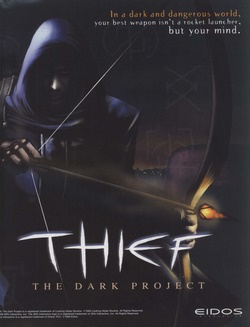
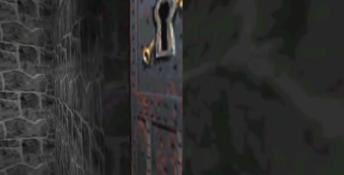
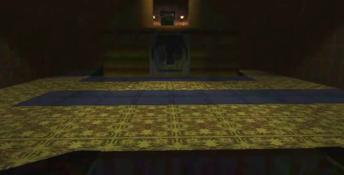
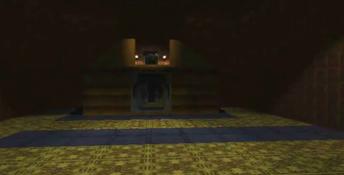

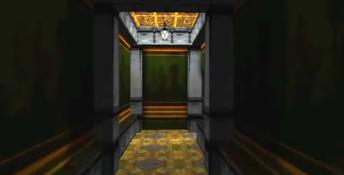
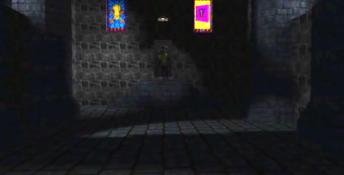
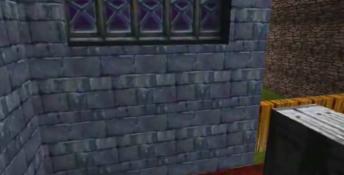


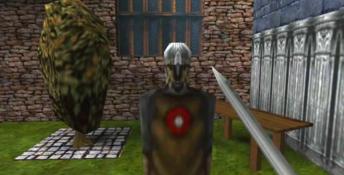

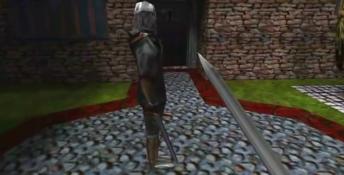
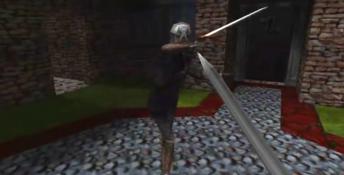
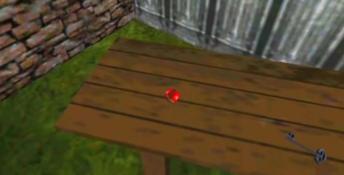
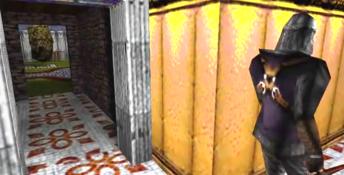
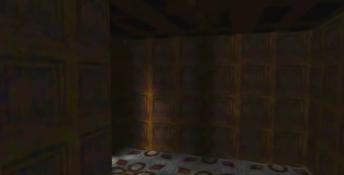
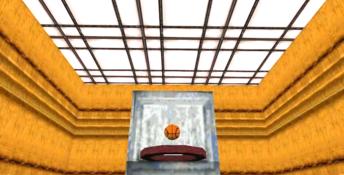
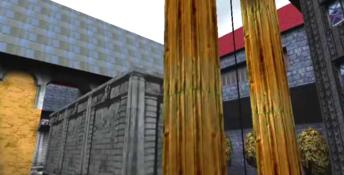

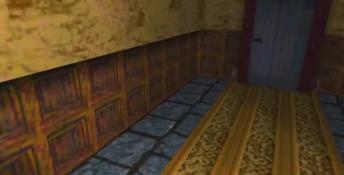
 A Way Out
A Way Out
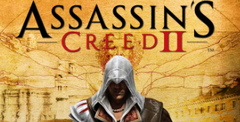 Assassin's Creed: 2
Assassin's Creed: 2 Crysis 3
Crysis 3
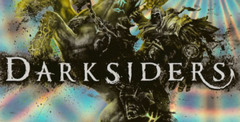 Darksiders
Darksiders
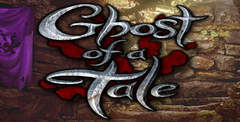 Ghost Of A Tale
Ghost Of A Tale
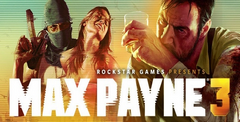 Max Payne 3
Max Payne 3
 Mirror's Edge
Mirror's Edge
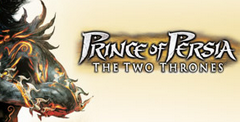 Prince of Persia: The Two Thrones
Prince of Persia: The Two Thrones
 Ryse Son Of Rome
Ryse Son Of Rome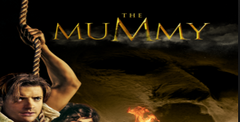 The Mummy
The Mummy
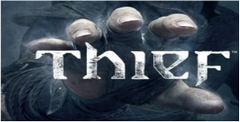 Thief
Thief We Happy Few
We Happy Few